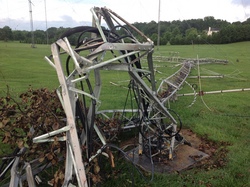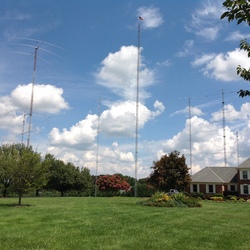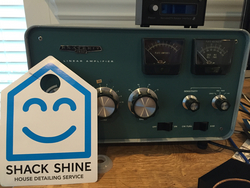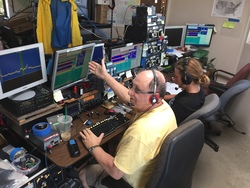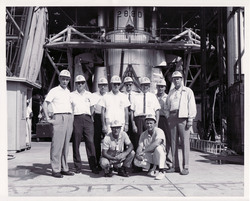 August 24, 2016 Editor: Paul Bourque, N1SFE | ||||||
IN THIS ISSUE
Aloha! This weekend will be a wonderful opportunity to get Hawaii into your logbook, as the Hawai`i QSO Party happens then. Kansas and Ohio will also have their events. If you're chasing NPOTA stations, all ten Kansas NPOTA sites will be on the air! If RTTY is more your style, the Slovenia Contest Club's RTTY Championship runs for 24 hours. The KCJ contest is potentially a good place to find the less common Japanese prefectures. If you work all 47 of them, you can apply for the WAJA award from the Japanese Amateur Radio League. During Labor Day weekend, there are Colorado and Tennessee QSO parties, and if you're working on your CW skills the CWops CW OPEN provides three separate sessions of four hours each over the weekend. Especially on the west coast, there will be plenty of stations involved in the All Asia DX Contest, phone. The three-day weekend could also be a good time to get outside antenna work done for the upcoming contest "season". Attention Bay Area Amateurs: The San Francisco Radio Club (SFRC) is holding the 2nd annual San Francisco 2M FM QSO party on Saturday August 27, 2016, from 10AM to 2PM Pacific Time (1700z - 2100z). ZIP codes are like grid squares and are multipliers. There are categories for mobile and fixed stations just like the ARRL UHF/VHF contests. Even with a handheld, you can participate in a fun contest. More info can be found on the club website. If you have any questions, please contact Robert, AD6I. BUSTED QSOS IARU Region 2 encompasses the Americas, as Ramon, XE1KK, kindly pointed out. Complete information for all contests follows the Conversation section August 25 August 26 August 27
August 28 August 31 September 1 September 2 September 3
September 4 September 5 September 6 September 7 There's a new release of the Win4K3Suite, software dedicated to the control of your K3 series of transceivers from your Microsoft Windows computer. Win4K3Suite provides a software panadapter using SDRPlay (showing up to 1.8 MHz bandwidth), LP-PAN, or a video capture board for the P3. This new release has improved SDRPlay performance and fixes an issue with the Elecraft Frequency Memory Editor files. During the recent NAQP Phone contest on August 20th and 21st, you likely heard members of the Florida Contest group using "Ron" as part of the exchange, in memory and honor of Ron Weitjen, WD4AHZ, who succumbed to cancer earlier this year. Ron was known to many in the WCF section and beyond as a friend and worthy competitor.
On June 21st, an EF0 tornado cut a twelve-mile path across western Howard County. One of the casualties of the storm was the tower for the ten meter antenna at W3LPL. Frank Donovan reports that thanks to very generous volunteer help by dozens of members of the Potomac Valley Radio Club and The Columbia Amateur Radio Association, a new 200 foot tower has gone up in its place. The new tower will be the home of an 8-element ten meter Optimum Wideband Array (OWA) Yagi designed by W8WWV, it itself a refinement of previous designs by K3LR, WA3FET, and NW3Z. The antenna is expected to be up by September, just in time for the upcoming contest season.
Contact with the STEREO-B (Solar Terrestrial Relations Observatories) satellite, which NASA used in the past to obtain greater insight into our sun's behavior, has been re-established after nearly two years of silence. STEREO-B and it's twin, STEREO-A, provide insight on CMEs (Coronal Mass Ejections) and other sun phenomena which are important to radio propagation. NASA's Deep Space Network was used to reach the spacecraft. A new Yahoo group dedicated to QSO parties has been in existence since April 2015. With the numbers of members currently near one hundred, the group includes those that are interested in participating, as well as many state QSO party administrators and team members. Dave, WN4AFP, who is the Team Leader of the South Carolina QSO Party, values "the opportunity to share ideas with active QPers. For state QSO party leaders, this is an excellent way to obtain feedback following your event, exchange new rule ideas and more. You can find out what works and what needs to be re-tooled. It's also a great way to build relationships in this contest niche." Prosign - Accepted as short for "Procedural Signal": In CW, a sequence of dots and dashes that are used to convey a particular meaning about the communication itself, such as end of transmission, "SK", over, "K", or wait, "AS". They are written as the concatenation of one or more regular characters, sent or received with no intervening spaces. In contests, you might hear the "AS" prosign being sent by an operator when she can't yet log a contact due to a rebooting computer or other problem.
Last weekend, while driving to a Multi/2 for the NAQP Phone contest and listening to the radio, I happened on this week's Ted Radio Hour episode, "Why We Lie", which provided some insights into why people can be dishonest. Dan Ariely, a speaker in the show, has suggested some techniques that could be adapted to the contesting context to discourage cheating: before starting to operate, have the logging program ask the contester to explicitly promise that they will operate within the bounds the rules, and then before they submit their log, promise that their log follows all of the rules. The WRTC 2018 qualification standings have been updated to reflect the 2016 ARRL DX Phone and CW final scores, the EU HF 2016 claimed scores, and 2016 IARU Region 1 Field Day final scores. OPERATING TIP - Call Again Later Dennis, N6KI, suggests that when running, when you can't copy a station despite multiple attempts, do not just abandon them by just calling CQ. Dennis suggests saying "I can't copy you well right now, please call again later, or if my signal fades up." He wants that station to know they are very important to him and not just dismiss them with a "Sorry, no copy....CQ Contest!" He finds that most will come back due to that courtesy. "This technique could really pay off when you are winning contests by a small margin of QSOs." Jim, KA2RVO, via the Elecraft mailing list, suggested the free online book Signal Processing For Communications. I skimmed the introductory chapters, and it is interesting enough to add to my reading list, in my case as a potential good review of the mathematical underpinnings for DSP, and how they relate to practical real-world characteristics of communications channels. The book builds on the theory introduced in early chapters to ultimately discuss the design of a modem that provides 2400 baud communications over a telephone-grade channel. Back in February, AMSAT announced it is seeking volunteers to assist with the technical details and development of Phase 4 "Five and Dime" ground terminals. The satellite will be using the 5 and 10 GHz bands, with an underlying digital transmission transport layer. The technical details are to be "open source," and the project's source files are kept on Github. It's interesting to read the weekly progress reports in that portion of the repository, and some of the source code for various DSP receivers that will eventually be posted may find crossover application for controlling skimmer hardware. Orbital Angular Momentum (OAM) is a characteristic of electromagnetic waves that is starting to garner interest as a means to increase the number of signals using a single frequency. Individual signals with different OAM values can be distinguished and apparently do not interfere with one another, according to an article in IEEE Spectrum. (Ward, N0AX) If you'd like maximum life from your lithium ion batteries, charge them slowly, and try not to continually charge them, according to this article in the New York Times. VE7BQH maintains UHF/VHF antenna comparison spreadsheets. Recently they've been updated, and uploaded to W7GJ's website. They are also available with an HTML view via dxmaps.com. The tables include information on expected gain figures when stacking them in different common configurations. Steve, K6OIK, as part of a presentation to the Foothills Amateur Radio Society, has prepared a paper entitled "Amateur Radio Resources that Save Space". His secret is to store radio-related books, articles, papers, and so on electronically, or take advantage of resources available online. He also updated a list of radio-useful software on the club's website. Learning Opportunity
After I drove with my daughter from Seattle to San Diego late last week in advance of her junior year of college, I had the opportunity to participate in the NAQP contest as part of the M/2 effort of NX6T. Dennis, N6KI, coordinated the operators from the San Diego Contest Club (SDCC). The station location was on a hilltop, and originally the QTH of Nash, W6HCD (SK). Like many in our hobby, and especially those in southern California, Nash was an engineer, involved in the defense and aircraft industry and even space launches as the Launch Logistics Specialist for NASA's Jet Propulsion Laboratory. He was consistently generous to the SDCC.
Over the years the noise floor at his location increased, making it increasingly difficult to pick out the weak ones on the low bands. Small lot sizes and development of adjacent properties make low-noise receiving antennas a challenge. The subject of "How to be a Good Guest Operator" has been covered in past presentations at Contest University and beyond, and to me it boils down to using guest etiquette, with particular attention to operating as the host desires. I arrived on time, with everything I needed for self-maintenance: water and a sandwich. Dennis provided operator introductions, and a tour of the grounds, and a rundown of the equipment and antenna topology. While the Elecraft K3s were familiar to me, the logging software, Wintest, was not. Thankfully, most logging programs are similar in concept, and my N1MM skills translated well enough. I even learned the hand signals I needed to make or recognize when a new multiplier needs to be worked. Dennis expressed disappointment in the band conditions - ten meters wasn't opening, and fifteen was marginal. He put me on the 20 meter run station, where I thought the band was great, compared to recent not-as-great conditions in the Pacific Northwest. Later in the day, the rate went down, and I was moved to the multiplier station. Dennis took the run position. There was time to have snippets of discussion between the contacts, and for us to pay more attention to one another's operating as we had to coordinate to get multipliers. The exchange for NAQP is name and the state. At one point, I received the name "Victor" as the name of the other operator, and I asked for a phonetic spelling, as I have friends who are named Victor and others named Viktor. After I completed the contact, Dennis told me to log what the name sounded like for phone, and to not waste time getting the exact spelling - the SSB log scoring process would accept alternative spellings. Between contacts, I expressed my incredulity that this would actually occur. Dennis was "staunch in his conviction." I didn't ask for any more spellings of names that had alternatives. After the contest, I followed up with Bill, AC0W, NAQP SSB Contest Manager, with this particular example. His response was thoughtful, detailed, and insightful. I'll summarize, and any mistakes are mine, and mine alone. Note that this absolutely does NOT apply to the CW and RTTY NAQP contests, because in those events, you are copying the actual letters of the names in the exchange. FOR PHONE NAQP ONLY, it turns out that for many common names, the log checking software will accept alternative spellings. For example, "Brian" could be the operators name, but the receiving operator could log "Bryan" and still be credited with the QSO. The alternate-name database is likely not exhaustive, and probably only covers common names. So if someone gives you a name that is uncommon, it's best to ask for a phonetic spelling. Note that this only works for sound-alike alternatives. For example, if you know the other operator by their call, and their real name is "Richard" but they're sending "Dick," you have to log "Dick" to be credited for the contact. Log what is sent! Sometimes in a contest, an operator will start out with one name, realize it's too long or too difficult to communicate, and then change their exchange in the middle of the contest. The log checking software can detect this situation, and QSOs made with the fickle station both before and after the change will be credited. Remember, these are the guidelines for PHONE NAQP only, as I think understand them. Wow! Here's another example of the care, dedication, and thoroughness that a contest sponsor employs when scoring your logs. And, while Dennis was right, I was also a little right in the case of "Victor" as it's likely not a common name. That's all for this time. Remember to send contesting related stories, book reviews, tips, techniques, press releases, errata, schematics, club information, pictures, stories of improvements to your contest station, and blog links to contest-update@arrl.org 73, Brian N9ADG 25 Aug - 7 Sep An expanded, downloadable version of QST's Contest Corral in PDF format is available. Check the sponsor's Web site for information on operating time restrictions and other instructions. HF CONTESTS CWops Mini-CWT Test, Aug 24, 1300z to Aug 24, 1400z, Aug 24, 1900z to Aug 24, 2000z, Aug 25, 0300z to Aug 25, 0400z; CW; Bands: 160, 80, 40, 20, 15, 10m; Member: Name + Member No., non-Member: Name + (state/province/country); Logs due: August 27. VHF+ CONTESTS WAB 144 MHz QRO Phone, Sep 4, 1000z to Sep 4, 1400z; SSB; Bands: 2m Only; British Isles: RS + serial no. + WAB square, Other: RS + serial no. + country; Logs due: September 25. See W/VE Islands QSO Party, Keyman's Club of Japan Contest, Kansas QSO Party, Colorado QSO Party, Tennessee QSO Party, MI QRP Labor Day CW Sprint above. August 26, 2016 August 27, 2016 August 28, 2016
August 29, 2016 August 31, 2016 September 1, 2016 September 3, 2016 September 5, 2016 September 6, 2016 ARRL Information Click here to advertise in this newsletter, space subject to availability. Your One-Stop Resource for Amateur Radio News and Information ARRL membership includes QST, Amateur Radio's most popular and informative journal, delivered to your mailbox each month. Subscribe to NCJ - the National Contest Journal. Published bimonthly, features articles by top contesters, letters, hints, statistics, scores, NA Sprint and QSO Parties. Subscribe to QEX - A Forum for Communications Experimenters. Published bimonthly, features technical articles, construction projects, columns and other items of interest to radio amateurs and communications professionals. Free of charge to ARRL members: Subscribe to The ARRL Letter (weekly digest of news and information), the ARES E-Letter (monthly public service and emergency communications news), Division and Section news -- and much more! ARRL offers a wide array of products to enhance your enjoyment of Amateur Radio. Visit the site often for new publications, specials and sales. Donate to the fund of your choice -- support programs not funded by member dues! Reprint permission can be obtained by sending email to permission@arrl.org with a description of the material and the reprint publication. ACKNOWLEDGEMENTS ARRL Contest Update wishes to acknowledge information from WA7BNM's Contest Calendar and SM3CER's Contest Calendar. | ||||||
